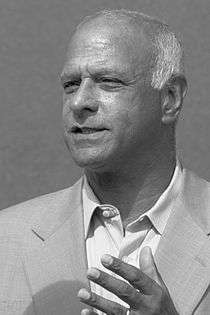Bill Campbell (mayor)
| Bill Campbell | |
|---|---|
|
Campbell in 2012 | |
| 57th Mayor of Atlanta | |
|
In office January 1994 – January 7, 2002 | |
| Preceded by | Maynard Jackson |
| Succeeded by | Shirley Franklin |
| Personal details | |
| Born |
William Craig Campbell 1953 (age 62–63) Raleigh, North Carolina |
| Political party | Democratic |
| Alma mater |
Vanderbilt University (B.A.) Duke University Law School (J.D.) |
William Craig "Bill" Campbell[1] (born 1953) Was the 57th Mayor of Atlanta, Georgia from January 1994-January 2002. He was the third black mayor in the city's history. Born in Raleigh, North Carolina, Campbell was the first black student to attend an all-white school in Raleigh City Schools at the age of seven. He attended William G. Enloe High School and is the youngest of three siblings.His older brother Ralph Cambell Jr. was the first black person to hold statewide office in North Carolina. William Campbell is a member of Omega Psi Phi.
Childhood Integration
In the fall of 1960, Campbell became part of history when his parents enrolled the then 7-year-old boy at Raleigh’s all-white Murphey Elementary School; this was the first step in integrating the largely white school Raleigh City School System. In 2010 he recalled this time while talking to WRAL NEWS over the phone. “My family prepared me by simply saying this. ’This is important, and you’re going to have to do it. You’re going to have to endure it…” Campbell’s parents also tried to enroll Williams older brother Ralph, who is a former state auditor, and their sister at the time; Though only William the youngest, was approved.[2]
Mayor of Atlanta
Heartily endorsed by his predecessor, Maynard Jackson, to take the reins in the 1993 election, Campbell subsequently fell into disfavour during his second term, despite defeating then-president of the Atlanta City Council, Marvin S. Arrington, Sr. The 1997 race was known for its emphasis on the racial overtones often not publicly seen in the African-American community, with Campbell being the lighter-skinned candidate and Arrington the darker complexioned. His term was from January 1994 to January 2002[3] Campbell would later be criticised for deploying anti-Black racist messaging in an attempt to deflect criticism of his record as mayor.[4] Campbell was succeeded by Shirley Franklin. Following his tenure as mayor, he moved to Palm Beach Gardens, Florida, where he worked as a practising attorney. He was disbarred by order of the Supreme Court of Florida as a result of his tax evasion conviction.[1]
Failure of Atlanta Empowerment Zone
In November 1994, the Atlanta Empowerment Zone was established, a 10-year, $250 million federal program to revitalise Atlanta's 34 poorest neighbourhoods including the Bluff. Scathing reports from both the U.S. Department of Housing and Urban Development and the Georgia Department of Community Affairs revealed corruption, waste, bureaucratic incompetence, and specifically called out interference by mayor Campbell.[5][6]
Involvement with Corporate Water Privatisation
According to the documentary, "Blue Gold - World Water Wars," [7] Mayor Campbell accepted a $6,900 campaign contribution and a trip to Paris from water privatisation company Suez even though he was "not running for office."
Tax Evasion Conviction
In August 2004 Campbell retained high-profile attorney Billy Martin to defend him against several indictments by a federal grand jury on racketeering, bribery, and wire fraud. The charges came from a five-year federal investigation into possible corruption during his time as Mayor of Atlanta. Campbell was later acquitted on all charges relating to the indictments; although on March 10, 2006, a federal jury convicted him on three counts of tax evasion. He was sentenced by U.S. District Court Judge Richard Story to 30 months in prison for the three counts on tax evasion. He was also ordered to serve a year on probation, pay a $6,000, and pay more than $60,000 in back taxes. On August 21,2006 he reported to the Federal Correctional Institution in Miami, Florida.[8]
Campbell was released from prison in February 2009 after receiving a shortened sentence by enrolling in a drug treatment program. This came just a short time after he told a federal judge that he was not struggling with a substance abuse problem. It was reported that the New York Times that “Prison officials said inmates must offer documentation of prior substance abuse to enter the treatment program, but for privacy reasons they said they could not disclose whether Mr.Campbell submitted such proof.” Mr.Campbell statements to the judge wasn't used to determine whether or not he could enter the program.[8]
After leaving prison he lived in a halfway house until October 21, 2008.
References
- 1 2 Florida Bar
- ↑ WRAL (2010-09-06). "50 years later, man recalls entering Raleigh's all-white schools :: WRAL.com". Retrieved 2016-09-18.
- ↑ Atlanta Mayor Wins Runoff and 2d Term - New York Times
- ↑ CNN.com - Embattled Atlanta mayor raises racial tension - October 9, 2000 Archived January 12, 2008, at the Wayback Machine.
- ↑ "Empowerment zones: Boondoggle or aid to poor?", Atlanta Business Chronicle, November 6, 2000
- ↑ Scott Henry, "Federal grants go to groups with shaky past", Creative Loafing, September 26, 2007
- ↑ Video on YouTube
- 1 2 Dewan, Shaila (2008-03-05). "Ex-Mayor of Atlanta Enrolled in Prison Drug Program After Denial of a Problem". The New York Times. ISSN 0362-4331. Retrieved 2016-09-18.
External links
- U.S. Attorney's Press Release RE: Indictment
- Ten page indictment summary
- U.S. Attorney's Press Release RE: Conviction
- U.S. Attorney's Press Release RE: Sentence
| Political offices | ||
|---|---|---|
| Preceded by Maynard Jackson |
Mayor of Atlanta January 1994 – January 2002 |
Succeeded by Shirley Franklin |

